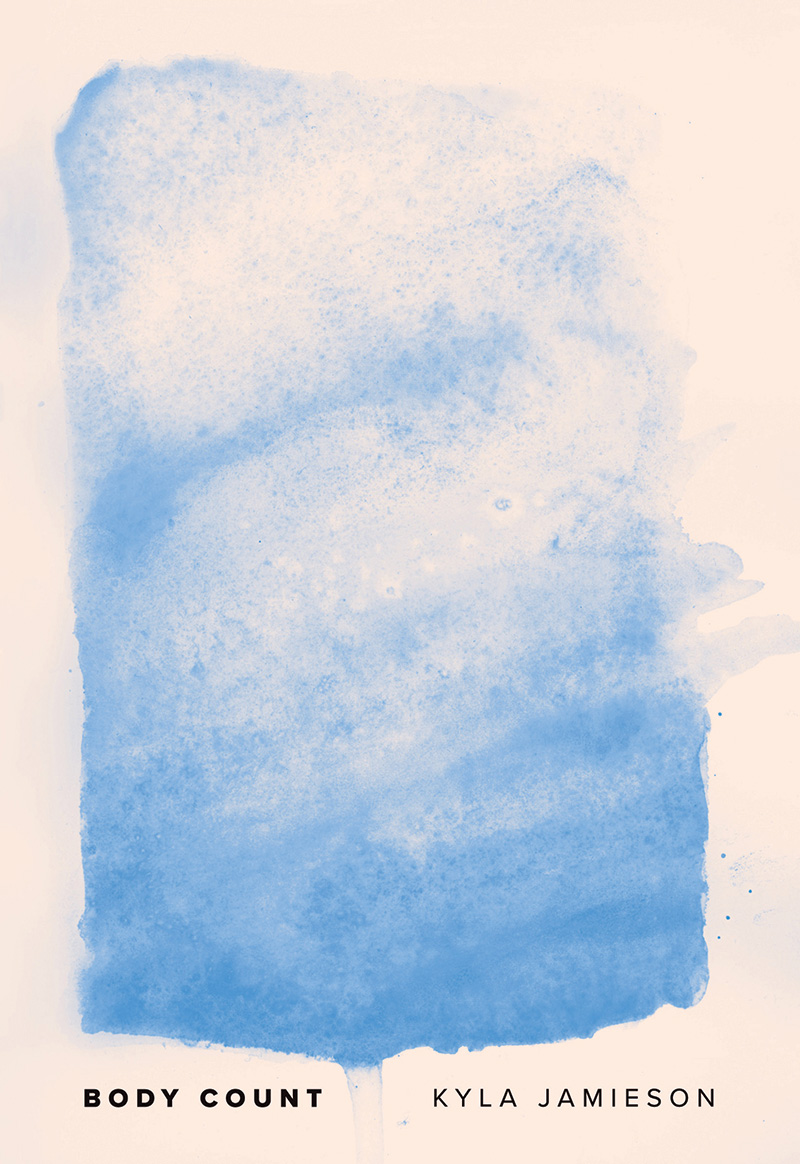When I reach poet Kyla Jamieson via Zoom on a Tuesday afternoon, she’s sitting in bed in her South Granville apartment in Vancouver. Jamieson and her partner recently adopted a kitten and they need to shut themselves in the bedroom occasionally to give him space. “He’s very energetic,” she laughs.
Jamieson has been spending her quarantine days exploring quiet corners of her neighbourhood. It’s a very different reality than the one she’d been planning several months ago while preparing to launch her debut poetry collection Body Count. Jamieson’s book was one of the lucky few to make it to press during the pandemic (Nightwood Editions released the collection in April). It’s strikingly timely considering the global turn of events.
Body Count is full of aching poems about love, longing, sex, grief and trauma. The initial sections examine the experience of existing as a woman and a woman artist in the world — a world held up by capitalism and patriarchy and their inherent violence. Jamieson’s voice is one of assertive defiance, but it’s also tender and vulnerable.
Then, midway through the book, the tone shifts.
In March 2017 Jamieson experienced a disabling concussion that developed into a condition called post-concussion syndrome. The syndrome’s symptoms can include sensitivity to noise, light and movement, cognitive impairment (including memory loss), fatigue, chronic pain and mobility issues. In a poem titled “Kind of Animal” Jamieson writes: “It sounds melodramatic/ but all this not moving/ is killing me. I dream of swimming/ every night for a week./ In the beginning I needed help/ to walk but none came/ so I stayed inside where I couldn’t fall/ or get lost.”
Jamieson spoke to The Tyee about writing, illness, isolation and what disabled voices and experiences can contribute to this shared cultural moment. It’s been lightly edited for length and clarity.

The Tyee: What was the process of writing these poems when you were dealing with the aftermath of your concussion?
Kyla Jamieson: I had a lot of cognitive effects from my concussion. For example, I basically had no short-term memory. One of my roommates at the time, her mom was a doctor and she happened to be over visiting. She did this concussion assessment test and part of it was that she would say four or five words to me, and I was supposed to say them back to her. I think I got one, maybe two. That was just how affected my memory was. It’s interesting to write when you have that going on. I had already been working with writing in the Notes app on my phone, but I would be writing while I was walking around or doing other things. Then, after my concussion, I was at first dictating a lot, like dictating conversations and texts to Siri. I have all these screenshots of full-on conversations that I’d have with Siri because that was my only company!
I was always making so many notes because otherwise I couldn’t remember anything. I’d go one block to Shoppers and couldn’t remember what I went there for. I was having to use the Notes app and post-it notes to navigate the day-to-day and then, along the way, I started writing down observations and ideas about what I was experiencing with the concussion. At a certain point, I think that kind of accrued and I regained enough faculties that I was able to shape some of those things into poems.
Did the injury change other aspects of your writing?
Before my concussion, I was actually more focused on prose. I did a BFA and then I was finishing my coursework for my MFA in creative writing when I got my concussion. I think I had a big 5,000-word assignment due right before my concussion, and I think I’ve written 5,000 words in the last three years! I mean, my eyesight was affected in a way that made it hard for me to read, and when it’s hard to read it’s hard to write and it’s especially hard to write sentences and to read paragraphs. My eyes and my brain were moving words all over, so they really got lost in the page and the meaning would get confused. So poetry was the only form that I could really write in.
Before my concussion, I was writing a lot of different things in different genres. I wasn’t putting everything I was thinking about being queer, being mixed race, having a trauma history, loving people and building friendships and community in my poetry. My poetry was kind of my side thing, or something that I experimented with. It was always something that I was doing, but it wasn’t my only outlet. And then with my concussion, it became my only outlet. I’ve only really just started writing paragraphs again.
You mentioned that the poems in the first half of the book were based on things that you were writing before your concussion. How did you conceive of creating this book and bringing these two halves together?
It is roughly chronological, so I did add some poems to the first half of the book as I was editing it and getting it ready for publication. I did think: should these concussion poems just be on their own? I could do a whole book of just concussion poems. But for me, I feel like the whole book is about trauma. I look at the first section and it’s like, OK, there’s all this gendered violence and all this rape-culture trauma. I was feeling so triggered all the time when I was writing those poems. And even in the love poems I see attachment styles that are trauma-informed, and a way of keeping people at a distance that I see as being related to trauma.
You also write about the utility of the body, living under capitalism, which is interesting given that the notion of productivity and worth is so tied up in our physical selves.
Yeah, and burnout culture is just so pervasive. I was constantly going through those cycles of burnout even before my concussion. It was only after my concussion that, for example, I found a therapist who’s actually helpful, and who I’ve been able to make some progress with.
I remember thinking, right after my concussion, when I really couldn’t function: Wow, I’ve never taken a sick day. It was just a transformative experience for me to even realize that I could do that. Maybe I had not gone to campus one day because I was sick or something, but for years I was modelling, and you couldn’t not go to work no matter how sick you were. Or I was working a minimum wage job and I was making just barely enough money to pay rent and if I missed a day of work, I wasn’t going to be able to make rent. All of that and all of these capitalist values and the idea that people are only as valuable as their productivity... it’s all tied up in ableism. I really think that everyone suffers from ableism, and all of our bodies experience the weight of ableism, even at the same time that many of the people in those bodies consider disabled people to be less valuable.
So much innovation is driven by disabled people, who have to find different solutions and envision different ways of doing things. I think the fact that I’ve had to do that is part of why coronavirus and social distancing is not breaking my spirit. I already lost all of my coping mechanisms before — I lost exercise, I lost going out, I lost socializing in the ways I was used to, I lost reading... I lost pretty much everything that I would turn to. And that’s what a lot of people are experiencing now.
A large part of the second half of the book deals with your experience of isolation, grief and loneliness after your concussion. What has it been like for you to watch everyone else now going through something you’ve already experienced?
I feel like the entire status quo is being disrupted right now. All of our systems and the ways that everyone was used to doing things are changing, and that’s only disruptive to you if you were participating in it. Because I was already excluded from so much of it, it’s not a big transition for me. I’ve been describing it as eerie. It’s eerie to see so much support offered for people going through this shift, when, as a disabled person, I went through a shift already... I mean, a lot of people going through this shift are well, they aren’t sick, they don’t have symptoms, they don’t require medical care. They’re not, for example, having to deal with loss of income as well as extremely expensive medical care. And, at the same time, a lot of people are being offered a lot of support. And also, because everyone is going through it together, there’s sort of collective empathy and understanding.
I’ve been laughing, looking at Instagram, because people are making art about coronavirus. There’s a comic of all the days of the month and then partway through March the days just start floating away and then April is just a big tangle of lines. It’s funny, because I got my concussion in March and I’m like: It’s so cute! All these people made art about my concussion! You guys are all making art about my life now!
A lot of the difficulty that I experience with my disability, and that a lot of other people experience, it’s not simply that the disability is challenging — which it very much is — but it’s that other people’s lack of understanding, or their lack of accommodations, is challenging. And now people are really proving that they can change their understanding and their way of doing things, by making virtual appointments an option or making virtual schoolwork an option. Whereas when I needed to miss a meeting or to do it from home, people would make comments, like, “Oh, why isn’t she in the office for a meeting?” Or, “She’s coming in later, but she couldn’t come in for that other meeting?”
It’s eerie and I think it’s also really frustrating. It’s frustrating to know that, even with the temporary COVID increase for people who are on disability assistance, people are still receiving at least $500 less than people on CERB [Canada Emergency Response Benefit]. And CERB is a direct acknowledgment that that person receiving it is not labouring. When both of those bodies aren’t labouring, why is one worth more? And also, because our government and our society view productivity and consumerism as one of the main ways we participate in society, why don’t we want disabled people to participate?
There’s a real level of honesty and vulnerability in your book. Have other people shared their experience of reading your work? Did you have any particular reader in mind when you put these poems together?
I was really thinking about people who specifically have post-concussion syndrome. But there is so much overlap — I have a friend who has Lyme disease and we have so many similar symptoms, or I’ll find someone on Instagram who’s posting about myalgic encephalomyelitis but I feel like they’re posting about all of my symptoms. So I was writing specifically with people with post-concussion syndrome in mind, but there’s so much connection with other experiences of illness and disability within that.
A lot of the reactions that I’ve been getting have been really encouraging. Sometimes there are people whose experience hasn’t equipped them to connect with the poems about rape culture, for example, but a lot of people that I felt like I was really writing it for have said that it felt very validating and that it made them feel they could be more honest and forthcoming and less ashamed or more willing to share their feelings. Which is all I really want — to make people feel seen and hopefully to bring them closer to themselves and let them know that it’s OK to be this vulnerable, too.
What has it been like, publishing a book in the middle of a pandemic?
Well, to be honest, because I have so much fatigue as part of my symptoms I was kind of dreading having to do live events and the travel associated with them. And it’s basically on poets and writers to plan their book tours. It’s a lot of labour and it’s really exhausting for me to do live events, so I was honestly already thinking about doing my launch from my bed. When I would mention that to people, say last fall, the response was: Oh, haha, that’s a funny idea. And now everyone is doing their launches on Instagram Live! And I’ve talked to other people, too, who, because of whatever pressures they’re under, felt a sense of relief, actually, when so many things were cancelled. I think that says a lot about our society and what normal has looked like for so long.
I mean, it is hard. My publicist got laid off. Thankfully she was able to get CERB and hopefully she’ll be rehired, but she was amazing, so that was hard to lose. In a way it feels like the book might get lost in the mix, but also I think it has meant less strain on my mind and on my body and perhaps more people are receptive to my readings-from-bed concept. It’s complicated, like so many things are. It’s a difficult time to have a book come out, but I really hope that it still finds its readers and I do think that the book has a lot to say about this time and a lot to offer people who are just now going through some of the things that I went through with my concussion and the immediate aftermath. I hope that people can find it useful. People have told me that it’s calming. Someone told me that she felt less anxious reading it, so maybe that’s something it can do for people. ![]()
Read more: Health, Rights + Justice
















Tyee Commenting Guidelines
Comments that violate guidelines risk being deleted, and violations may result in a temporary or permanent user ban. Maintain the spirit of good conversation to stay in the discussion.
*Please note The Tyee is not a forum for spreading misinformation about COVID-19, denying its existence or minimizing its risk to public health.
Do:
Do not: